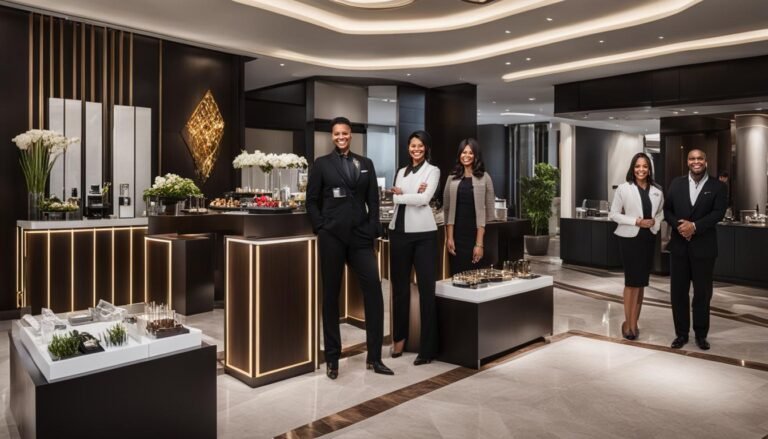Effective Communication Strategies with Guests
The hotel industry is experiencing a resurgence, with average hotel occupancy levels projected to reach 63.8% in 2023. In order to provide a memorable experience for guests, it is crucial for hotels to have effective communication strategies. This includes using guest communication techniques and honing hospitality communication skills.
Key Takeaways:
- Effective communication strategies are essential for providing a memorable guest experience.
- Guest communication techniques and hospitality communication skills are crucial in the hotel industry.
- Clear and specific communication helps in problem-solving and addressing guest concerns.
- Personalized communication techniques enhance guest satisfaction and loyalty.
- Prompt response time and multiple communication channels ensure accessibility and convenience for guests.
Importance of Guest Communication
In the hotel industry, effective communication with guests is paramount to ensure their satisfaction and create a positive experience. By improving communication with hotel guests, hotels can build strong relationships, address concerns, and enhance overall guest satisfaction. To achieve this, it is crucial to employ effective guest communication strategies and utilize guest interaction tips.
One of the key ways to improve communication with hotel guests is by actively listening to their needs and concerns. This involves paying attention to verbal and non-verbal cues, engaging in active dialogue, and demonstrating empathy. By doing so, hotels can foster a sense of trust, build rapport, and ultimately provide personalized service tailored to each guest’s preferences.
Another important aspect of effective guest communication is being proactive in addressing guest needs. This includes anticipating potential issues, providing relevant information, and offering solutions before guests even have to ask. By being proactive, hotels can exceed guest expectations and showcase their commitment to delivering exceptional service.
Authentic Communication
When it comes to guest communication, authenticity is key. Hotels must strive to deliver an experience that aligns with their brand values and meets guests’ expectations. By emphasizing brand authenticity in their communication, hotels can establish a genuine connection with guests and foster increased engagement and satisfaction.
Authentic communication involves more than just providing information or assistance; it’s about creating a memorable brand experience. This can be achieved by showcasing the unique qualities and offerings of the hotel, whether through personalized recommendations, storytelling, or sharing local insights. When guests feel that the hotel is being true to itself, they are more likely to trust the brand and have a positive perception of their stay.
One effective way to incorporate authenticity into guest communication is by highlighting the hotel’s distinct features and values. For example, if sustainability is a core aspect of the brand, the hotel can emphasize eco-friendly initiatives in their communication, such as providing information on recycling programs or promoting energy-saving practices. This not only enhances the guest experience but also demonstrates the hotel’s commitment to its principles.
Authenticity in communication fosters a sense of trust and loyalty, as guests appreciate when a hotel delivers on its promises and provides an experience that aligns with their expectations.
By prioritizing brand authenticity in guest communication, hotels can create meaningful connections with their guests, enhance the overall guest experience, and cultivate a positive brand reputation.
Clear and Specific Communication
Clear and specific communication is crucial in guest interactions. When addressing guest concerns or inquiries, hotels should use simple and correct language to avoid confusion. Providing detailed responses to guest issues is also vital in ensuring effective problem-solving.
By using clear language, hotels can ensure that guests understand the information being conveyed. This includes using words and phrases that are easily comprehensible and avoiding technical jargon or complex terminology. Additionally, maintaining a friendly and approachable tone in communication can help put guests at ease and encourage open dialogue.
Specific communication is equally important in guest interactions. Hotels should provide precise and detailed responses to guest concerns, addressing each point raised. This demonstrates attentiveness and shows that the hotel values the guest’s feedback. By being specific in their communication, hotels can effectively address guest issues and provide satisfactory solutions.
Benefits of Clear and Specific Communication:
- Minimizes misunderstandings
- Enhances guest satisfaction
- Promotes effective problem-solving
- Builds trust and credibility
- Improves overall guest experience
| Clear and Specific Communication Tips |
|---|
| “Use simple and correct language to avoid confusion.” |
| “Provide detailed responses to guest concerns.” |
| “Address each point raised in guest inquiries.” |
Overall, clear and specific communication is essential in guest interactions. By using language that is easily understandable and providing detailed responses, hotels can minimize misunderstandings, enhance guest satisfaction, and effectively resolve issues. Implementing these communication strategies contributes to a positive guest experience and fosters long-term guest loyalty.
Personalized Communication
Personalized communication techniques are crucial in creating a truly memorable guest experience. By understanding individual preferences and tailoring interactions accordingly, hotels can make guests feel valued and appreciated. One effective way to achieve personalized communication is by creating individualized traveler profiles, which allow hotels to gather information about guests’ preferences, interests, and previous stays. This enables hotels to provide tailored recommendations, personalized amenities, and customized service.
For example, let’s say a guest has a history of enjoying spa treatments during their stays. By accessing the individualized traveler profile, hotel staff can proactively offer spa packages or recommend available services upon check-in. This not only enhances guest satisfaction but also demonstrates that the hotel values their preferences.
Additionally, personalized communication extends beyond just guest preferences. It also involves remembering and addressing guests by their names, acknowledging special occasions, and anticipating their needs. This level of attentiveness goes a long way in creating a positive impression and fostering guest loyalty.
The Power of Personalization
“Personalization is the key to creating a memorable guest experience. By understanding and catering to individual preferences through techniques like individualized traveler profiles, hotels can make guests feel valued and appreciated.”
| Benefits of Personalized Communication | Examples |
|---|---|
| Enhanced guest satisfaction | Providing tailored recommendations based on previous stays |
| Increased guest loyalty | Remembering and addressing guests by their names |
| Positive word-of-mouth | Acknowledging special occasions and surprising guests with personalized touches |
Personalized communication techniques are a powerful tool for hotels to differentiate themselves and provide exceptional guest experiences. By leveraging individualized traveler profiles and going the extra mile to meet guests’ unique needs, hotels can leave a lasting impression that keeps guests coming back.
Prompt Response Time
When it comes to guest communication, prompt response time is crucial. Hotels need to prioritize timely responses to guest inquiries and feedback to ensure a positive guest experience. This includes regularly reading and responding to guest reviews, which provide valuable insights and an opportunity to improve guest satisfaction.
Guest reviews play a significant role in shaping a hotel’s reputation. By actively engaging with reviews, hotels can address any concerns or issues raised by guests and showcase their commitment to providing excellent service. Responding promptly shows that the hotel values guest feedback and is dedicated to resolving any problems that arise.
In addition to guest reviews, social media engagement is another important aspect of prompt communication. Many guests turn to social media platforms to ask questions, seek information, or share their experiences. By actively monitoring and responding to these platforms, hotels can maintain direct and timely communication with their guests, building relationships and solving problems in real-time.
| Benefits of Prompt Response Time | Tips for Timely Communication |
|---|---|
|
|
By focusing on prompt response time, hotels can demonstrate their commitment to exceptional guest service and create positive impressions. This level of responsiveness not only improves guest satisfaction but also contributes to an overall positive guest experience, leading to increased loyalty and positive word-of-mouth.
In-Person Communication, Hotel Website, Email, Social Media, Text Messaging, and Hotel Mobile App
Effective guest communication involves utilizing multiple communication channels to cater to guests’ preferences and ensure accessibility and convenience. Hotels can offer various means of communication, including in-person interaction, a user-friendly hotel website, email communication, social media engagement, text messaging services, and a hotel mobile app.
When it comes to in-person communication, hotels can train their staff to provide warm and friendly interactions with guests. This personal touch can create a positive impression and foster a sense of hospitality. Additionally, having visible and easily accessible staff members throughout the hotel can make guests feel more comfortable and confident in seeking assistance.
The hotel website serves as a crucial communication tool, providing guests with essential information about the hotel and its services. Clear and concise contact information, such as phone numbers and email addresses, should be prominently displayed, enabling guests to reach out easily. Additionally, the website can include an FAQ section and online chat support to address common queries and provide real-time assistance.
Email communication allows hotels to send important updates, reservation confirmations, and personalized offers directly to guests’ inboxes. By using a professional and friendly tone, hotels can establish a connection with guests and keep them informed about relevant information and promotions. It is important to ensure that emails are well-designed, mobile-friendly, and include clear calls-to-action.
Social media platforms provide an opportunity for hotels to engage with guests in a more informal and interactive manner. Hotels can create dedicated social media accounts to share updates, showcase amenities, and respond to guest inquiries and feedback. By maintaining an active online presence, hotels can build a community of loyal followers and leverage social media as a powerful communication tool.
Text messaging services and hotel mobile apps offer convenient and immediate communication channels for guests. Hotels can send automated text messages for booking confirmations, check-in instructions, and personalized recommendations. Additionally, having a well-designed mobile app allows guests to access hotel services, make requests, and communicate directly with staff members, enhancing the overall guest experience.
In-Person Communication Tips:
- Train staff to provide friendly and personal interactions with guests.
- Ensure visible and easily accessible staff members throughout the hotel.
Hotel Website Essentials:
- Prominently display clear contact information, including phone numbers and email addresses.
- Include an FAQ section and online chat support for real-time assistance.
Email Communication Best Practices:
- Use a professional and friendly tone to establish a connection with guests.
- Ensure well-designed, mobile-friendly emails with clear calls-to-action.
Social Media Engagement:
- Create dedicated social media accounts to engage with guests informally.
- Respond promptly to guest inquiries and feedback.
Text Messaging Services and Hotel Mobile Apps:
- Offer automated text messages for booking confirmations and personalized recommendations.
- Develop a user-friendly mobile app for seamless communication and access to hotel services.
By embracing multiple communication channels, hotels can ensure effective and efficient guest communication, resulting in enhanced guest satisfaction and a more memorable stay experience. Choosing the right communication channels and leveraging technology can help hotels establish stronger connections with their guests and build lasting relationships.
Embracing Technology
Technology plays a crucial role in effective guest communication. Hotels can leverage various guest communication software and systems to enhance their communication processes and stay connected with their guests. These tools are designed to streamline communication, improve efficiency, and provide a seamless guest experience.
One example of guest communication software is GuestTouch. This platform allows hotels to automate guest messaging, enabling timely and personalized communication throughout the guest journey. With features like pre-arrival messages, post-stay surveys, and automated responses, hotels can efficiently engage with guests and gather valuable feedback.
Canary Technologies is another innovative solution that focuses on guest communication systems. This platform offers real-time messaging capabilities, allowing hotels to interact with guests via SMS, email, and voice calls. By utilizing these multiple communication channels, hotels can ensure prompt and convenient communication, addressing guest inquiries and concerns in a timely manner.
HelloShift is yet another guest communication software solution that helps hotels centralize their communication efforts. With features like messaging, task management, and guest request tracking, hotels can streamline their internal communication processes and provide a seamless experience for their guests.
| Guest Communication Software | Key Features |
|---|---|
| GuestTouch | – Automated messaging – Personalized communication – Pre-arrival and post-stay interactions |
| Canary Technologies | – Real-time messaging – SMS, email, and voice call capabilities – Convenient guest communication |
| HelloShift | – Centralized communication – Messaging, task management, and guest request tracking |
By embracing technology and utilizing guest communication software and systems, hotels can efficiently manage their guest interactions, provide personalized experiences, and ultimately enhance guest satisfaction.
Consistent Level of Guest Service
Providing a consistent level of guest service is crucial in effective guest communication. Every interaction with hotel staff should be characterized by friendly and positive interactions, ensuring that every guest feels valued and attended to. Consistency in guest service is key to creating a positive guest experience and fostering loyalty.
Hotel staff should be trained to prioritize friendly interactions with guests, making them feel welcome from the moment they arrive. A warm greeting and a genuine smile can go a long way in establishing a positive rapport. Staff should also be attentive to guest needs, actively listening to their concerns and offering prompt assistance.
Consistency in guest service extends to all areas of the hotel, from front desk encounters to housekeeping services and dining experiences. It’s important for staff members to maintain a professional demeanor while ensuring a personal touch. By consistently delivering top-notch service, hotels can create a memorable stay for guests and leave a lasting impression.
| Key Elements of Consistent Guest Service | Examples |
|---|---|
| Warm and friendly greetings | “Welcome to our hotel! How may I assist you today?” |
| Attentiveness and active listening | “I understand that you’re looking for a nearby restaurant. Let me provide you with some recommendations.” |
| Professionalism with a personal touch | “Thank you for choosing to stay with us. Would you like a complimentary upgrade to a room with a view?” |
| Prompt assistance and problem-solving | “I apologize for the inconvenience. Let me resolve the issue with your room key right away.” |
Consistent guest service is the foundation of a positive guest experience. When guests receive a high level of service throughout their stay, they are more likely to feel satisfied and inclined to return or recommend the hotel to others. By prioritizing friendly interactions and maintaining consistency in all aspects of guest service, hotels can create a welcoming and memorable environment for every guest.
Body Language and Presentation
In addition to verbal communication, body language and presentation play a crucial role in guest interactions. The way staff members carry themselves and present themselves visually can greatly impact the guest’s perception of the hotel. Energetic staff, maintaining eye contact, displaying positive body language, and presenting themselves in a professional manner are key elements in effective guest communication.
Energetic staff members convey enthusiasm and create a welcoming atmosphere. When guests encounter energetic and enthusiastic staff members, it sets a positive tone for their overall experience. A warm smile and a genuine interest in assisting guests can go a long way in making them feel valued and appreciated.
Conclusion
Effective communication strategies with guests are essential in the hospitality industry. By implementing guest communication techniques and honing hospitality communication skills, hotels can greatly improve guest satisfaction and create memorable experiences.
Embracing technology is another key factor in enhancing effective hospitality communication. Utilizing guest communication software and systems, such as GuestTouch, Canary Technologies, and HelloShift, can streamline communication processes and keep hotels connected with their guests.
Maintaining a consistent level of guest service is crucial in effective guest communication. From friendly interactions to professional presentation, every staff member should be trained to deliver exceptional service and ensure that every guest feels valued and attended to. This consistency contributes to a positive guest experience and fosters loyalty.
Utilizing personalized communication techniques further enhances guest engagement and satisfaction. By creating individualized traveler profiles and employing personalized communication strategies, hotels can make their guests feel seen, heard, and valued. This personalized approach goes a long way in creating a positive and lasting impression.
Overall, effective hospitality communication is key to guest satisfaction and loyalty. By implementing these strategies, hotels can enhance guest experiences, foster positive relationships, and ultimately achieve success in the competitive hospitality industry.







